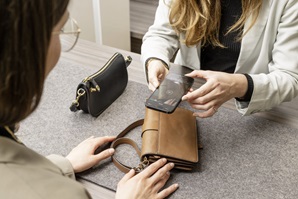
Product piracy is on the rise worldwide. According to the German Federal Customs Administration, counterfeit branded goods worth 435 million euros were confiscated last year alone – an increase of more than 100 million compared to the previous year.
“Manufacturers, brand and product protectors are looking for protection mechanisms that ideally do not require any intervention in the product and yet allow a clear distinction to be made between a counterfeit and a genuine product,” says Oliver Steinbis, Inventor & Project Lead for Origify, a development from the Bosch Group.
The solution was initially developed as an invisible solution for tracking and protecting internal company products, such as sensors from the automotive sector, without interfering with the products, and is now also available to other companies as a complete end-to-end platform. Each individual product is optically recorded during production, the data is converted into a binary file of a few kilobytes and stored in a cloud. Authenticity can later be confirmed by comparing it with this data record. This requires a modern smartphone and the Origify app or a manufacturer specific white label solution with access to the cloud database.
“This technology is not reliant on specialist retailers or other inspection bodies, manufacturers can even allow customers to become product detectives themselves without having to examine authenticity labels, which are also becoming increasingly easy to counterfeit,” says Oliver Steinbis.
By optically recording every single product during industrial production, Origify is turning previous protection concepts upside down: “Protection against counterfeiting also include the registration of intellectual property via copyright, design protection and patents.
Infringements must be identified with great effort; authorities such as customs only become active at the trademark owner’s request, for example via a border seizure request. With Origify, we start directly at the production stage and can establish a chain of authenticity between the manufacturer and the end customer,” explains Oliver Steinbis from Bosch.
To do this, the product type is first analysed and the optimum area for optical detection is determined. Whereas in the past, controversial cases usually required the immediate involvement of expensive experts and often involved testimony against testimony, an initial analysis can be carried out much more quickly for a product captured with Origify. If a comparison with the stored data record is successful, the product corresponds to its delivery condition at the original manufacturer. Only if the result is negative a further investigation has to be initiated, which may result in the discovery of a counterfeit.
“With this solution, owners of brand and design rights can effectively protect themselves via their own supply chain between the manufacturer, specialist retailer and even the end consumer. The app functionality, which can also be integrated into a brand’s own application, makes the customer an active part of product authentication if desired,” explains Oliver Steinbis. The method, which is based solely on an optical and digitalised fingerprint, does not require any investment in other security methods – neither NFC chips nor other methods need to be attached to or on the product.
According to the company, the Origify process has also already proven itself in large scale production. Even products that have been manufactured thousands of times usually differ in details that are invisible to the eye. “For our process, the suitable zones of the product are first identified, test series are carried out and then the system is implemented in automated production. The differences detected by the system, which occur even with millions of items, make it easy to clearly identify an original,” concludes Oliver Steinbis.











